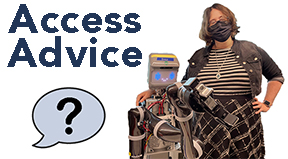
AccessComputing co-PI Elaine Schaertl Short has been bringing her deep insight, wealth of knowledge, and engaging and compassionate voice to AccessComputing News in the form of an advice column. Students are invited to email accesscomp@uw.edu with questions related to disability and computing, particularly as it relates to academia and computing.
Topics covered so far have included how to talk to future employers about medical leave, job searching and disclosure, getting involved in research, and advisor support. Read the questions posed below to see what Elaine has shared with the AccessComputing community.
AccessAdvice: How Can Advisors Support Their Students with Disabilities?
As someone with invisible disabilities and who is neurodivergent, navigating accommodations in a Ph.D. program relied solely on conversations between my advisor and me, as university accommodations offices are typically suited to support undergraduate needs involving class assignments and exams (e.g., testing location, time allotment)—which are often irrelevant to Ph.D. students—or ergonomic needs (e.g., the university provided an ergonomic workbench-height chair to support my lower back injury). Fortunately, my advisor and I have a good relationship, and I was able to voice what I needed to be successful in my program.
I plan on pursuing a faculty position one day; what advice do you have for advisors to help signal to their students that you want to discuss and learn how best to support them? I know for the majority of my academic career, I wanted to "tough it out" because I was concerned about being treated differently or carrying the stigma associated with my situation, but I believe we can do better for the next generation of junior researchers and Ph.D. students.
AccessAdvice: Disability Identity
I have some medical diagnoses that are often considered disabilities. However, they are mostly invisible, and I have a lot of compensating strategies that help keep them that way—to the point where well-meaning acquaintances and even once a medical professional have said things like “oh, you can’t have ADHD, you got good grades in high school.” The strategies that let me “pass” have costs in time and energy, but most of the time the results are good enough to get by.
I find the discussions of some disability community groups valuable—I’ve gotten lots of really great strategies from strangers on the internet—but I am never sure whether I should claim to be “disabled,” given that I am mostly not perceived that way. Being part of a community of people who share similar challenges is valuable to me, and I love the idea of being able to share back into the community my own strategies in case they will help others. On the other hand, I don’t want to somehow take away from the experience of people who are more affected by their conditions—and I’m afraid of being judged by people as a hypochondriac or attention-seeking for claiming that my conditions qualify as a disability. And, beyond the interactions with others, accepting that my conditions are (at least sometimes) life-affectingly disabling can be a hard thing to hear in my own mind and come to terms with.
So, how do you know if you’re ready to/willing to/deserve to claim a disability identity?
AccessAdvice: Getting Involved in Research
Currently, I have a full-time job where I work from home. My manager is flexible with my work schedule, so I can take some time out of my work day to have meetings and work on my day job later that day. Down the road, I'm thinking of enrolling in a master's program to hopefully pursue a research career in human-computer interaction (HCI) in industry or academia.
How do I complete an independent research study to see if I want to pursue a research career? One option is to do an independent research study through my alma mater’s continuing education program, but I'd have to enroll and get approval from a professor beforehand.
I’d also like to know:
- How do I contact professors about this and how do I ask for approval for an independent research study from a professor?
- How do I highlight my research experience; what should I highlight in my resume?
- What other options might I have to do an independent research project?
AccessAdvice: Job Searching
I am about to start a faculty job search; what advice do you have for me?
AccessAdvice: Medical Leave
I am currently taking a semester of medical leave and am actively interviewing for internships. Is it okay not to disclose the fact that I’m on medical leave during my interviews? I never lie, and my graduation date is still the same, but I do not feel comfortable informing my interviewers of this. Any advice on how to proceed going forward?